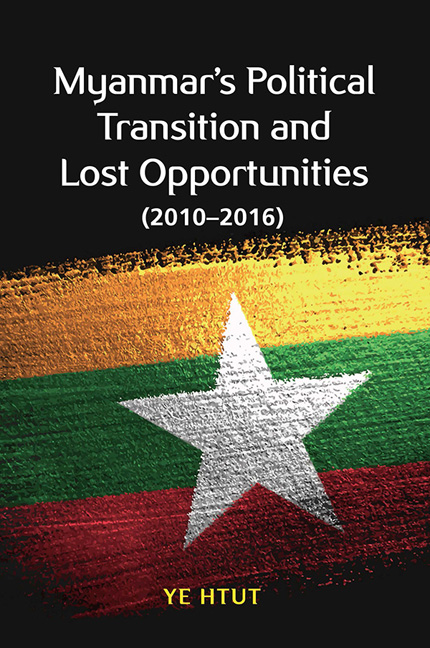Book contents
- Frontmatter
- Contents
- Foreword
- Acknowledgements
- Introduction: Myanmar's Political Reforms
- 1 The National Convention
- 2 The Constitution
- 3 The Union Solidarity and Development Party
- 4 Myanmar Spring and Aung San Suu Kyi
- 5 The Union Government
- 6 The Government and the Parliament
- 7 Shwe Mann's Checkmates
- 8 Turning Points
- 9 Media Reform
- Epilogue
- Appendix A President Thein Sein's Inaugural Address
- Appendix B President Thein Sein's First Address to the Cabinet
- List of Interviewees
- Index
- About the Author
- Plate section
- Frontmatter
- Contents
- Foreword
- Acknowledgements
- Introduction: Myanmar's Political Reforms
- 1 The National Convention
- 2 The Constitution
- 3 The Union Solidarity and Development Party
- 4 Myanmar Spring and Aung San Suu Kyi
- 5 The Union Government
- 6 The Government and the Parliament
- 7 Shwe Mann's Checkmates
- 8 Turning Points
- 9 Media Reform
- Epilogue
- Appendix A President Thein Sein's Inaugural Address
- Appendix B President Thein Sein's First Address to the Cabinet
- List of Interviewees
- Index
- About the Author
- Plate section
Summary
Myanmar Media Landscape (1988–2011)
Under the military regime, the Press Scrutiny and Registration Division of the Ministry of Home Affairs tightly controlled the print media. Though administratively it was under the Home Ministry, the director was a former military intelligence officer who directly reported to military intelligence headquarters, until 2004 when the military intelligence corps was purged after the sacking of Prime Minister General Khin Nyunt. Publishing licences were awarded only to trusted people, government departments and military intelligence units. They, in turn, made a profit by leasing their publishing licences to genuine publishers. All publications were submitted for pre-publication censorship, as the 1962 Printing and Publishers Registration Law prohibited the publication or distribution of any printed material—other than that of a religious nature—without obtaining the prior approval of the government.
The government also controlled all domestic radio and television broadcasting facilities through the Ministry of Information (MOI). The official media remained propaganda organs of the government and did not report opposing views other than to criticize them. There were two private commercial TV operators and six FM radio channels that provided entertainment and sports programming. They were joint ventures with the state-owned Myanmar Radio and Television (MRTV), and they practised self-censorship. Mobile phone penetration was just 2.7 per cent of the population and Internet users numbered just over a hundred thousand, 0.3 per cent of the population in 2010. The government banned websites critical of the regime and blocked access to free email services and social media such as Facebook. Myanmar's freedom of expression was ranked 164 out of 168 countries.
After the military intelligence corps had been abolished, the Press Scrutiny and Registration Division was transferred to the MOI and the director was replaced by another military officer who had been the editor of a military science journal. After 2004, the national convention convened again to draw up the future constitution. On 10 January 2006 the convention began detailed discussions of principles for the fundamental rights and duties of citizens. It adopted fifty principles on 27 October 2006. One of the agreed principles allowed citizens to freely express and publish their convictions and opinions. As a result of the adoption of this principle, Senior General Than Shwe instructed information minister Kyaw Hsan to prepare for a new media landscape under the forthcoming constitution.
- Type
- Chapter
- Information
- Publisher: ISEAS–Yusof Ishak InstitutePrint publication year: 2019

